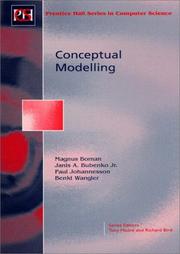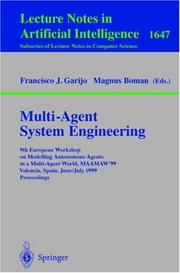| Listing 1 - 4 of 4 |
Sort by
|
Dissertation
ISBN: 9171531033 Year: 1993 Publisher: Stockholm : Royal Institute of Technology,
Abstract | Keywords | Export | Availability | Bookmark
 Loading...
Loading...Choose an application
- Reference Manager
- EndNote
- RefWorks (Direct export to RefWorks)

ISBN: 9780135148792 0135148790 Year: 1997 Publisher: London: Prentice Hall,
Abstract | Keywords | Export | Availability | Bookmark
 Loading...
Loading...Choose an application
- Reference Manager
- EndNote
- RefWorks (Direct export to RefWorks)
System Design --- Mathematical models --- Computer simulation
Book
Year: 1997 Publisher: S.l. University of Karlskrona/Ronneby
Abstract | Keywords | Export | Availability | Bookmark
 Loading...
Loading...Choose an application
- Reference Manager
- EndNote
- RefWorks (Direct export to RefWorks)

ISBN: 3540662812 9786610957767 128095776X 354048437X 9783540662815 Year: 1999 Volume: 1647 Publisher: New York : Springer,
Abstract | Keywords | Export | Availability | Bookmark
 Loading...
Loading...Choose an application
- Reference Manager
- EndNote
- RefWorks (Direct export to RefWorks)
In the ten years since the first MAAMAW was held in 1989, at King's College, Cambridge, the field of Multi-Agent Systems (MAS) has flourished. It has attracted an increasing amount of theoretical and applied research. During this decade, important efforts have been made to establish the scientific and technical foundations of MAS. MAAMAW publications are testimony to the progress achieved in key areas such as agent modelling and reasoning, multi-agent interaction and communication, and multi-agent organisation and social structure. Research results have covered a wide range of inter-related topics in each area including agent architectures, reasoning models, logics, conflict resolution, negotiation, resource allocation, load balancing, learning; social behaviour and interaction, languages and protocols, interagent and agent-human communication, social models, agent roles, norms and social laws, and static and dynamic organisational structures. The feasibility and the viability of the proposed models and techniques have been demonstrated through MAS applications in heterogeneous domains including electronic commerce, co-operative work, telecommunications, social and biological systems, robotics, office and business automation, public administration, social simulations and banking. As the applicability of the technology became understood, the multi-agent paradigm has been progressively accepted by product managers and system developers, giving rise to a considerable amount of business expectation from industry. These expectations do not rest on the concept or metaphor of agent, but on the development of MAS useful in an industrial setting, with real-time systems presenting the biggest challenge.
Intelligent agents (Computer software) --- Intelligent agents (Computer software) -- Congresses. --- Computer Science --- Engineering & Applied Sciences --- Computer science. --- Computer communication systems. --- Software engineering. --- Artificial intelligence. --- Computer Science. --- Artificial Intelligence (incl. Robotics). --- Computer Communication Networks. --- Software Engineering/Programming and Operating Systems. --- Software Engineering. --- Artificial Intelligence. --- Computer software engineering --- Engineering --- AI (Artificial intelligence) --- Artificial thinking --- Electronic brains --- Intellectronics --- Intelligence, Artificial --- Intelligent machines --- Machine intelligence --- Thinking, Artificial --- Bionics --- Cognitive science --- Digital computer simulation --- Electronic data processing --- Logic machines --- Machine theory --- Self-organizing systems --- Simulation methods --- Fifth generation computers --- Neural computers --- Communication systems, Computer --- Computer communication systems --- Data networks, Computer --- ECNs (Electronic communication networks) --- Electronic communication networks --- Networks, Computer --- Teleprocessing networks --- Data transmission systems --- Digital communications --- Electronic systems --- Information networks --- Telecommunication --- Cyberinfrastructure --- Network computers --- Distributed processing --- Intelligent agents (Computer software) - Congresses
| Listing 1 - 4 of 4 |
Sort by
|

 Search
Search Feedback
Feedback About UniCat
About UniCat  Help
Help News
News